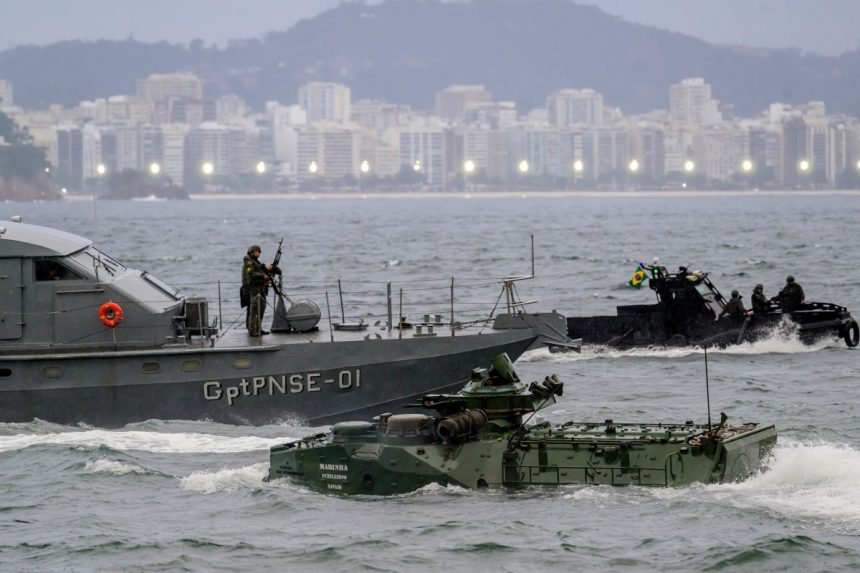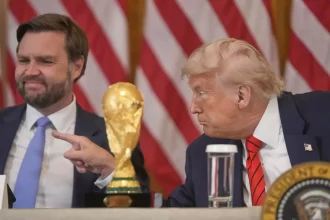As global power dynamics continue to shift, the BRICS alliance of major emerging economies is gathering in Rio de Janeiro for a crucial summit, aiming to deliver a united rebuke of the United States’ aggressive trade policies under Donald Trump’s leadership. Leaders from Brazil, Russia, India, China, and South Africa are meeting alongside new members such as Saudi Arabia, Iran, Egypt, and the UAE, representing nearly half the world’s population and 40% of the global economy.
Inside sources reveal that the group is preparing a joint statement denouncing Washington’s protectionist trade stance, particularly its sweeping tariffs on imports. These tariffs, which Trump reintroduced during his time in office, have triggered widespread concern among emerging economies, many of which rely heavily on trade.
Though the summit declaration is expected to avoid directly naming the United States or its former president, it will likely contain veiled criticisms targeting Washington’s approach to international trade. Diplomatic insiders note that China, in particular, prefers to avoid openly escalating tensions with the US, given its own fragile trade negotiations with Washington.
“The summit will be cautious in tone. Directly mentioning the United States is unlikely,” explained Marta Fernandez of the BRICS Policy Center in Brazil. “The priority is to maintain unity while also sending a subtle yet clear message.”
Leadership Gaps Cloud BRICS’ Aspirations
Nevertheless, the summit’s political momentum faces significant hurdles due to the absence of two high-profile leaders: China’s Xi Jinping and Russia’s Vladimir Putin.
Xi’s decision to skip the gathering for the first time since assuming the presidency has sparked considerable speculation. Experts believe his absence may be linked to diplomatic calculations, particularly regarding Indian Prime Minister Narendra Modi’s prominent role at the summit.
“Xi may be steering clear to avoid the appearance of being overshadowed by Modi, who’s receiving top honors at this summit,” noted Ryan Hass from the Brookings Institution.
In Xi’s place, Chinese Premier Li Qiang will lead the Chinese delegation. Analysts say this move signals Beijing’s desire to manage its relations carefully, without overexposing itself at a politically sensitive time.
Similarly, Russia’s Putin will also be absent, attending via video due to international legal risks stemming from war crimes allegations. These absences could significantly weaken the summit’s potential to project a unified front, particularly at a time when Brazil is seeking to boost its diplomatic profile ahead of major elections.
Brazilian President Luiz Inacio Lula da Silva has been leveraging international events to elevate Brazil’s status globally. Hosting the BRICS summit, the G20 summit, and COP30 within a single year forms part of Lula’s broader strategy to showcase Brazil’s diplomatic weight heading into a contentious 2026 presidential election.
Middle East Crises Expose Deep Rifts Within BRICS Bloc
While trade disputes are set to dominate the official agenda, escalating conflicts in the Middle East have also cast a long shadow over the BRICS summit.
Iran’s President Masoud Pezeshkian will not attend the summit, citing the aftermath of a violent military standoff with Israel. However, Iran’s representatives are pushing hard for BRICS to adopt a more aggressive stance on the Gaza crisis and Iran-Israel tensions.
Some member states are cautious, preferring a moderate position focused on dialogue and peacekeeping, while Iran is lobbying for stronger language backing Palestinian statehood and condemning Israeli military action.
These divergent views are straining the unity of the bloc, exposing the challenges that come with an expanded membership that includes nations with vastly different geopolitical interests.
Beyond trade and security, the BRICS summit will also explore opportunities for cooperation in artificial intelligence and global healthcare, as member nations seek to strengthen ties in innovation and public health resilience.
While BRICS now boasts a larger membership—adding countries like Saudi Arabia, Egypt, Ethiopia, and Indonesia—the group’s growing size also means greater difficulty in achieving consensus.
Nonetheless, Brazilian Foreign Minister Mauro Vieira remains optimistic about the bloc’s future.
“BRICS has always managed to find common ground on critical global issues. There’s every reason to believe we can do so again, even on difficult topics like the Middle East,” Vieira asserted.
As the summit progresses, the world’s attention will be fixed on whether BRICS can bridge its growing divides and solidify its place as a counterweight to Western-dominated institutions in the evolving global order.


